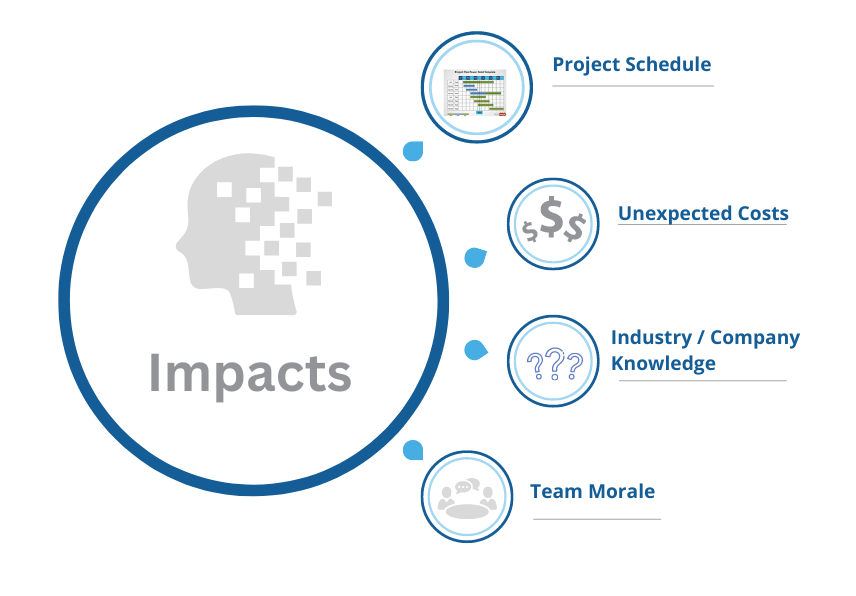By Jacob Coburn
The Impacts

Project Member leave the Project?
We have all been there at some point. You have kicked off a major project. You are about two weeks into the project and a key member of your project team or even worse, multiple members of your project team are no longer available.
Losing a key team member can impact the project schedule, cost, and quality, while also losing the ability to make quick decisions. The project members, which were just starting to become an effective team, could struggle to re-form and move forward.
Losing a key project team member could happen for a variety of reasons. In today’s landscape, this has been even more prevalent with Covid 19 impacting workforces around the globe. The first questions you might be asking yourself when you get the news is, “who is going to pick up the slack?” or “do we even have someone who knows how to pick up the slack?” The impact on a project can be significant.
In too many cases, you have just lost a subject matter expert (SME) that can readily provide the project team with the information needed to complete project-related tasks. In addition to having a wealth of knowledge in their area of expertise, they also know the history of your company and how it operates. They could be owners of important processes that will be impacted by the implementation. Or these could be team members that are responsible for locating and providing data essential to the project. They may also be responsible for making or influencing decisions for their designated area. All of these scenarios will have an impact on the project outcomes.
The project schedule can be impacted as the team tries to adjust and learn what is needed in their colleague’s absence. You and your project team were already feeling the pressure of meeting the deadlines without this additional challenge. Now, the project team morale is impacted as other team members are called upon to step up in the lost team member’s absence. These team members may not have the level of knowledge, skill, or experience, and this can lead to rework, stress, and additional time. We are all familiar with what happens when a project starts to run late; delays in delivery time, additional cost, and typically someone (in a higher position than you) starts to get frustrated.
Mitigating the Risk
- Cross-training/Identifying backups
- Documentation
- Hire outside help
How do companies manage or eliminate these types of risks? There may not be a surefire solution to completely overcome this type of loss, but there are options you can take to mitigate these risks.
The first would be cross-training. Cross-training is a great option. Why have one key team member that can provide you with support, when you can have a whole team of subject matter experts? At the very least identify a backup for your SME. This may not be realistic for all companies, where some team members are wearing multiple hats already, especially in small companies when they may only be a team of one.
The next option is not super flashy or novel, but it is tried and true. Documentation has been around for thousands of years. Sure, it has evolved from stone tablets to paper and eventually to electronic documentation. Many times, people take for granted the simple daily task they execute. They need to recognize that it is a procedure, and it should be documented. They are typically referred to as SOPs or Standard Operating Procedures. SOPs should include steps on how to perform the task, some rationale on why the task is being performed, what are the expected results, and who is involved in the process. As a side note, every team should already be creating SOPs regardless of the size of the team. This is extremely beneficial for keeping historical references on when, why, and if processes change over time.
Lastly, call in an expert when you need someone to fill in. We have had clients who will contract experienced HR technology consultants to help even before the loss of a key team member. Although a contractor may not have the inside or historical knowledge, they will be able to help your team navigate the landscape and assist your team in executing many of the client-side tasks involved in the implementation.
If you would like more information on how HRchitect can help you and your project team via our client-side consulting services, click here.

Jacob Coburn brings over 19 years of experience working within IT and over 15 years of experience working as a Business Analyst and Project Manager to the HRchitect team. Jacob has an excellent understanding of requirements gathering and documentation and is well versed in Project Management concepts and tools.
Find out more about Jacob Coburn on LinkedIn here: Jacob Coburn

